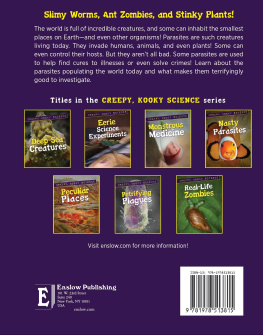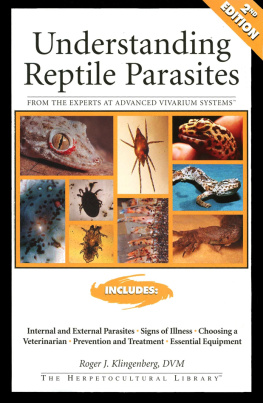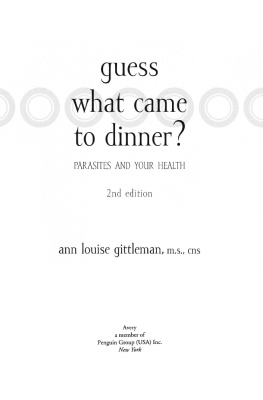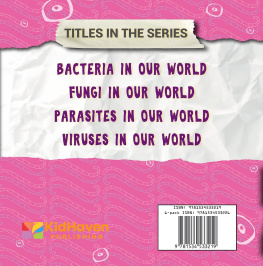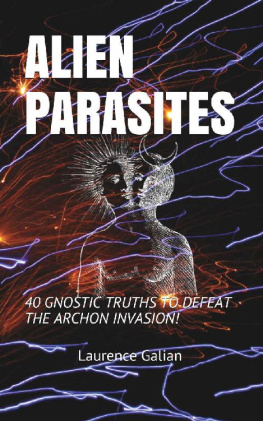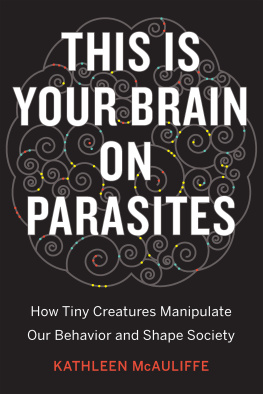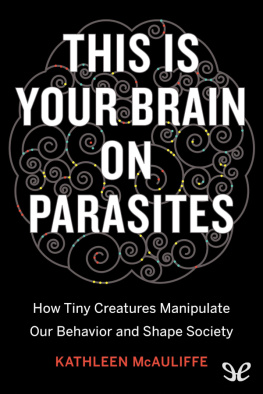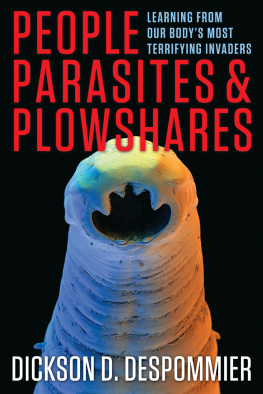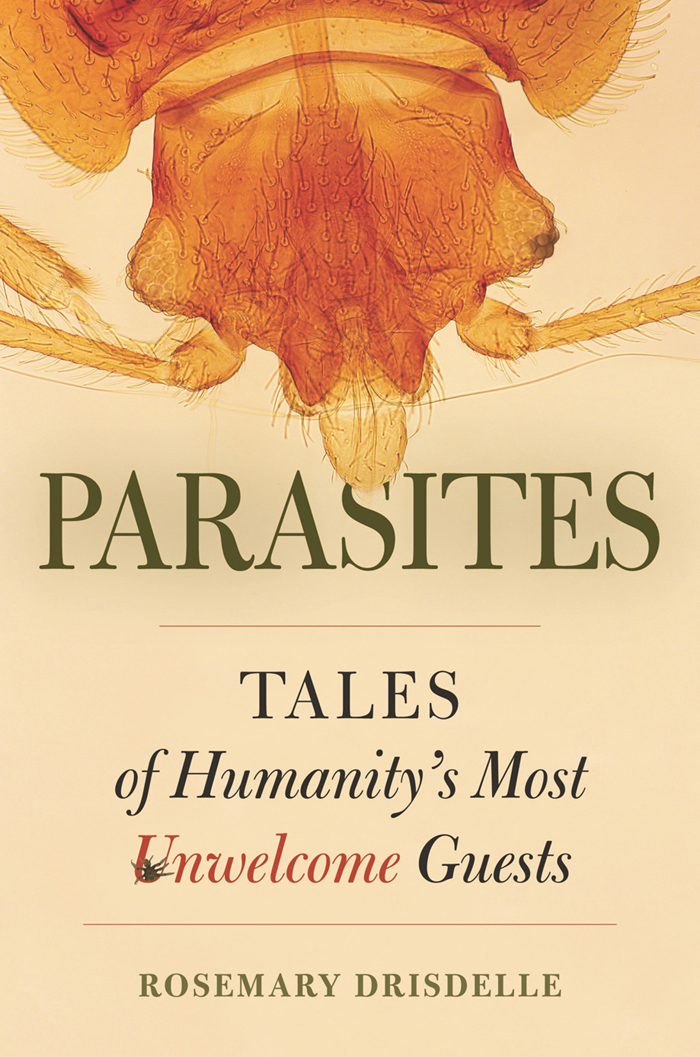Parasites
The publisher gratefully acknowledges the
generous support of the General Endowment Fund
of the University of California Press Foundation.
Parasites

TALES OF HUMANITYS MOST UNWELCOME GUESTS
Rosemary Drisdelle

UNIVERSITY OF CALIFORNIA PRESS
BERKELEY LOS ANGELES LONDON
University of California Press, one of the most
distinguished university presses in the United States,
enriches lives around the world by advancing scholarship
in the humanities, social sciences, and natural sciences.
Its activities are supported by the UC Press Foundation
and by philanthropic contributions from individuals
and institutions. For more information, visit
www.ucpress.edu.
University of California Press
Berkeley and Los Angeles, California
University of California Press, Ltd.
London, England
2010 by Rosemary Drisdelle
Library of Congress Cataloging-in-Publication Data
Drisdelle, Rosemary.
Parasites : tales of humanitys most unwelcome guests /
Rosemary Drisdelle.
p. cm.
Includes bibliographical references and index.
ISBN 978-0-520-25938-6 (cloth : alk. paper)
1. ParasitesPopular works. I. Title.
QL757.D75 2010
Manufactured in the United States of America
19 18 17 16 15 14 13 12 11 10
10 9 8 7 6 5 4 3 2 1
This book is printed on Cascades Enviro 100, a 100%
post consumer waste, recycled, de-inked fiber. FSC
recycled certified and processed chlorine free. It is acid
free, Ecologo certified, and manufactured by BioGas
energy.
To my husband, Vic, for giving me a new beginning
and leaving me in peace to do something with it.
HOW PEOPLE GOT WORMS
In the beginning,
the Earth mother took a handful of clay
and rolled it between her palms,
rolled it and rolled it
absently thinking
of calla lilies, fig blossoms, bull rushes.
It was long, and thin, and slippery
as entrails dangling from a buzzards hooked beak.
She breathed on it thoughtlessly;
it wriggled and
twisted
like
a serpent.
Now it had her attention,
and she saw that it was not good,
so she hid it
under Adams rib.
ROSEMARY DRISDELLE
The Prairie Journal, 2006
CONTENTS
Parasites that have changed human history
Parasites versus food safety regulationsis anything safe to eat?
How parasites get into our water and what we try to do about it
The unintentional but persistent global movement of parasites by humans
As in science fiction, some parasites do take over their hosts
Good, bad, and imaginarythe cultural meanings and practical uses of parasites, and the power of fear
Criminals who cast their lot in with parasites
The ones that seem to come out of nowhere, and where they really come from
Can we ever get rid of these unwelcome guests?
ILLUSTRATIONS
FIGURES
MAPS
ACKNOWLEDGMENTS
Many individuals contributed encouragement, suggestions, leads to new information, constructive criticism, and other assistance of various kinds to this work. My sincere thanks to all of them, in particular Judy Arbique, Russ Barton, William Campbell, Sally Colwell, David Cone, Geraldine Cooper Lesins, Kevin Forward, Clare Goulet, David Haldane, Todd Hatchette, Glen Lesins, Carolyn Swayze, my father, Martin Thomas, and the staff of microbiology at the QEII Health Sciences Centre in Halifax, Nova Scotia. Special thanks also to my agent, Michelle Tessler.
To my family, especially my husband, Victor Drisdelle, and my children, Beth McClelland, Kat McClelland, and Drew McClelland, thanks for your encouragement and for allowing me precious time to study and to write.
AUTHORS NOTE
A note about pseudonyms and fictitious characters: This is a work of nonfiction. In some accounts, pseudonyms are used when the real names are not known, or to protect the privacy of individuals whose identities are of no significance to this book. Where certain facts were not recorded, I have inferred details about cases from the available information. And in the rare instances in which I have created a character, I have aimed for a realistic composite of all those who have experienced the events under discussion. Again, I have done so only when an appropriate account of a single real individual was not available. In all cases, I have endeavored to make clear which details are fact and which are not.
Introduction
PARASITES ARE ALL AROUND us. Consider the ones that infect humans: hundreds of species live in human intestines, skin, lungs, muscle, brain, liver, blood, and everywhere else they can find a niche. Some of these parasites can live only in humans. When you realize that virtually every species of animal has a similarly large collection, and then acknowledge that plants have many as well, you begin to understand how numerous parasites really are. Even parasites have parasites.
Parasites are an odd and exceedingly diverse assortment of life forms that defy generalization: essentially their actions define them. The word parasite was first applied to humans, used to describe people who live by taking from others. The self-serving activities of such people are damaging to their hosts, whose resources they deplete. A parasite in the biological sense is similar: a parasite lives on, or in, another species, getting everything it needs from its host. In keeping with the cultural view that a parasite is a despicable creature, the strictest biological view holds that parasites damage their hosts.
Curiously, however, the word parasite isnt used consistently to describe all life forms that live in this way. Bacteria, fungi, and viruses that multiply in the tissues of other species are traditionally excluded. Tiny predators, such as mosquitoes, are excluded as well because they feed on, but dont live on, their hosts. In a medical sense, at least, parasites include protozoa, worms, and certain things with legs, such as mites and insectsbut only those that must spend at least part of their lives in or on the tissues of other living things.
We usually hear about parasites when they make people sick. Or we encounter them as a subject of revulsiondisgusting creatures to be annihilated as speedily as possible. Someone who unexpectedly discharges an intestinal worm is likely to grab the nearest makeshift weapon and pulverize it within seconds, despite the creatures utter inability to attack. If we discover an infestation of head lice, we quickly go on the attack, even if we have to douse ourselves with insecticides to win the battle. Even our enthusiasm for mistletoe, a traditional symbol of magic and affection, loses its luster when we learn that the plant is parasitic.
Our view of parasitism is a narrow one. Parasites not only have far-reaching and important impacts on the earths ecology, but they have much broader effects on our daily lives than we realize. We humans believe that we orchestrate our own affairs, good or bad, and that events are steered by action and counteraction, turned by decisions of world leaders or collective will. We read history books and newspapers and seldom find parasites there. They are there, but we dont see them. In this book, I explore this wider world of parasites.


